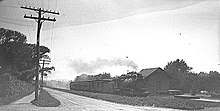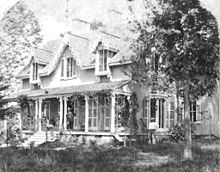Lutherville
Geography
Lutherville is located at 39°25′26″N 76°37′3″W / 39.42389°N 76.61750°W (39.4240, −76.6177).
According to the United States Census Bureau, the CDP had a total area of 2.1 square miles (5.5 km), all land.
The town is located north of Baltimore along York Road (Maryland Route 45). It is bordered on the north by Timonium, on the west by Interstate 83, on the south by Towson, and on the east by the Hampton neighborhood. The boundary between Lutherville and Timonium is Ridgely Road.
Lutherville is located in the Piedmont region of the United States, and lies in the humid subtropical climate zone, with hot and humid summers leading into winters that are chilly but not extreme by American standards. The average annual snowfall is 25 inches (64 cm) and average annual precipitation is 42 inches (107 cm).
Demographics
| Census | Pop. | Note | %± |
|---|---|---|---|
| 1960 | 12,265 | — | |
| 1970 | 24,055 | 96.1% | |
| 1980 | 17,854 | −25.8% | |
| 1990 | 16,442 | −7.9% | |
| 2000 | 15,814 | −3.8% | |
| 2010 | 6,504 | −58.9% | |
| 2020 | 6,835 | 5.1% | |
| Separated from Lutherville-Timonium CDP in 2010 Census | |||
As of the 2010 census, there were 6,504 people and 2,672 households in the CDP. The racial makeup of the CDP is 85.0% White, 3.4% African American, 0.2% Native American, 8.2% Asian, 0.2% Native Hawaiian and Pacific Islander, and 3.3% Hispanic or Latino.
Out of the 2,672 households recorded in the 2010 census, 28.3% had children under the age of 18 living with them.
Transportation
Roads
Major roads in Lutherville include:
- Dulaney Valley Road (MD-146), forming part of Lutherville's eastern boundary with Hampton
- Ridgely Road, forming Lutherville's northern boundary with Timonium
- Seminary Avenue (MD-131)
- York Road (MD-45)
Public transportation

The Maryland Transit Administration's light rail line serves the community with the Lutherville Light Rail Stop. In addition, bus routes 8 and 9 provide regular service along the York Road corridor, meeting at the Lutherville Light Rail Stop. There is also a limited amount of bus service on Bus Route 12 along Dulaney Valley Road to Stella Maris Hospice. In addition, the Baltimore CityLink Red line serves the Lutherville Light Rail station.
The MTA light rail line uses the right-of-way of the old Northern Central Railway (later, part of the extensive Pennsylvania Railroad system). During the Civil War, President Abraham Lincoln travelled through Lutherville on this railroad en route to Gettysburg, Pennsylvania, to deliver the Gettysburg Address on November 19, 1863. Less than two years later, on April 21, 1865, Lincoln's funeral train also passed through Lutherville on its way from Washington, D.C. to his final resting place at Springfield, Illinois. The Pennsylvania Railroad (PRR) operated long-distance passenger trains from Baltimore over the line to Chicago, St. Louis, and Buffalo as late as the 1960s. The former PRR Lutherville freight and passenger station on Railroad Avenue is now a private residence.
History



The oldest section of Lutherville dates back to 1852, when it was founded by two Lutheran ministers as a planned community, anchored by a Lutheran seminary and church. The land was originally part of the vast Hampton Estate of Charles Ridgely, from whom it was purchased in 1851.
The two ministers, Benjamin Kurtz and John Morris, named the community after the 16th-century German reformer Martin Luther. The Lutherville Female Seminary, as it was initially called when chartered in 1853, was built near the tracks of the Baltimore & Susquehanna Railroad, a forerunner of the Northern Central Railway. In 1895, the institution was renamed the Maryland College for Women. Following a devastating fire in 1911, the college was rebuilt and continued in operation until 1952. Its campus is now an adult congregate living facility, College Manor.
The Lutherville Historic District was added to the National Register of Historic Places in 1972. Notable structures, in addition to the old college building and the many Victorian homes, include:
- St. Paul's Lutheran Church, started in 1856 by John Morris. The present stone sanctuary was built in 1898.
- St. John's Methodist Church, built in 1869.
- Church of the Holy Comforter, an Episcopal church built in 1888.
- Oak Grove, the house of Lutherville founder John Morris, built in 1852 on Morris Avenue. Filmmaker John Waters lived in the Oak Grove house with his family as a teenager in the 1960s. Some of Waters' earliest filmmaking efforts took place at the house.
- Octagon house on Kurtz Avenue, built of concrete in 1855 by another Lutheran minister who also served as the town's postmaster.
Notable people
This section needs additional citations for verification. (July 2019) |
- All Time Low, pop punk band
- Raymond Berry, Baltimore Colts Hall of Famer
- Ryan Boyle, professional lacrosse player
- Bosley Crowther, film critic
- Cinder Road, rock band
- Divine, actor
- Samuel T. Durrance, astronaut/physicist
- Conor Gill, professional lacrosse player
- Mark Hamilton, Major League Baseball player
- Billy Hunter, former Major League Baseball shortstop and manager
- Phil Karn, internet engineer
- Santa J. Ono, medical scientist, 28th President, University of Cincinnati; 15th President, University of British Columbia
- Rafael Palmeiro, former Major League Baseball first baseman
- Jim Palmer, former Baltimore Orioles pitcher and Hall of Famer
- Kevin Plank, entrepreneur (UnderArmour), resident
- Brooks Robinson, former Baltimore Orioles third baseman and Hall of Famer
- Gavin Sheets, MLB player
- Mike Singletary, Hall of Fame football player, current NFL coach
- J. Frederick C. Talbott, U.S. congressman 1878–1918
- Bob Turley, former Major League Baseball pitcher
- Jerry Turner, television news anchorman (1929–1987)
- Johnny Unitas, former Baltimore Colt and Hall of Famer
- John Waters, filmmaker
- Derek Waters, actor & comedian
Education
- Public schools
- Dulaney High School (in Timonium)
- Hampton Elementary School
- Lutherville Laboratory Elementary School
- Ridgely Middle School
- Pinewood Elementary School
A portion of Lutherville's high school-age students attend nearby Towson High School.
Gallery
- Images of Lutherville
-
Lutherville Light Rail station
-
Former Pennsylvania Railroad station
-
Oak Grove in 2009
-
St. Paul's Lutheran Church
-
Former Maryland College for Women
References
- ^ "2020 U.S. Gazetteer Files". United States Census Bureau. Retrieved April 26, 2022.
- ^ "Profile of General Population and Housing Characteristics: 2010 Demographic Profile Data (DP-1): Lutherville CDP, Maryland". United States Census Bureau. Retrieved February 23, 2012.
- ^ "US Gazetteer files: 2010, 2000, and 1990". United States Census Bureau. February 12, 2011. Retrieved April 23, 2011.
- ^ "Geographic Identifiers: 2010 Demographic Profile Data (G001): Lutherville CDP, Maryland". United States Census Bureau. Retrieved February 23, 2012.
- ^ "Census of Population and Housing". Census.gov. Retrieved June 4, 2016.
- ^ "U.S. Census website". Retrieved March 29, 2019.
- ^ Daniel Carroll Toomey (1997). Baltimore During the Civil War. Toomey Press. p. 170. ISBN 0-9612670-7-0.
- ^ "The Route of Abraham Lincoln's Funeral Train". December 29, 1996. Retrieved April 15, 2008.
- ^ "Lutherville, Maryland a Victorian Experience". Baltimore County Public Library. January 25, 2008. Archived from the original on November 1, 2009. Retrieved July 19, 2009.
- ^ "National Register Information System". National Register of Historic Places. National Park Service. April 15, 2008.
- ^ "The Divine Childhood Home of John Waters". Wall Street Journal. April 11, 2017. Retrieved July 18, 2020.(subscription required)
- ^ Gunts, Ed (July 17, 2020). "Filmmaker John Waters' boyhood home goes up for sale". baltimorefishbowl.com. Retrieved July 18, 2020.
- ^ http://www.washingtonbayhawks.com/team/roster/index.html?player_id=49 Archived 2008-07-05 at the Wayback Machine Washington Bayhawk Player Bio
- ^ "Still Waters". New York Magazine. Retrieved November 19, 2015.
- ^ "A very sober-minded Derek Waters on work, life and doing Baltimore in Season 2 of 'Drunk History'". Baltimore Sun. Retrieved February 18, 2016.





